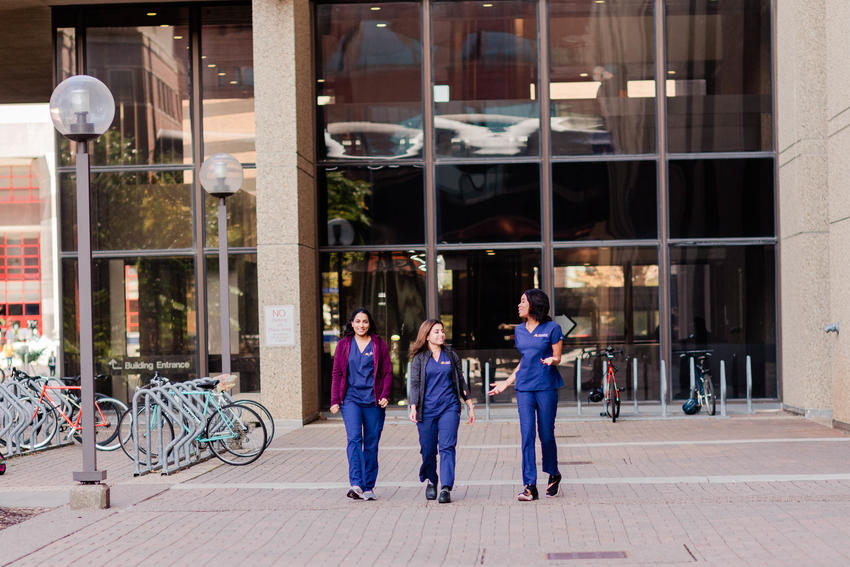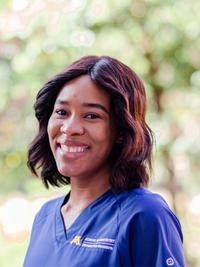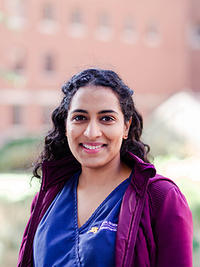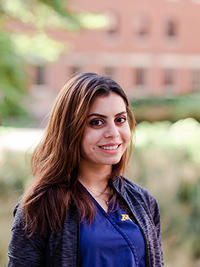PASS it on

Three women working to translate their dental degrees into United States licensure are taking every opportunity to learn while they’re back in school—and they’re giving back along the way.
Evi Addoh, Poornima Vasireddy, and Majd Qamhiyeh are all students in UMN PASS, or the University of Minnesota’s Program for Advanced Standing Students. PASS is a 29-month program designed for graduates of dental schools outside the United States and Canada who have moved to the United States and want to practice dentistry within the U.S.
Addoh moved from Nigeria in 2017, Vasireddy from India in 2014, and Qamhiyeh from Saudi Arabia in 2017. Though the three women are united in their interest in dentistry and their passion for teaching and learning, they come from varied backgrounds and bring those experiences with them to their studies and their time at the School of Dentistry.
The journey to Minnesota
Addoh found her way to Minnesota by way of Mississippi, where she earned a master’s degree in health promotion. She had previous experience working in private practice and at a teaching clinic. She’s loved dentistry since she was a child. “I am passionate about adding value and giving back to the community, empowering people to take control of their health, and bringing healthcare to those who are faced with limited or no access,” she said.
She chose the University of Minnesota so she could focus on her clinical skills, and because she “liked that UMN has an avenue for community outreach experience, and that students are integrated with other members of the class.”
For Vasireddy, moving to Minnesota meant being closer to family. When she moved to the U.S., she pursued her master’s degree in biology, shadowed United States dentists, and worked in microbiology. An experience taking a dental hygiene community course showed her that the University of Minnesota was where she wanted to be.
She wanted to be there so strongly that she applied several times. She was about to give up, and decided to try applying just one more time—and she was accepted.
She was excited to hone her clinical skills after so much time outside of dentistry. “In India, my experience was more focused on textbooks and study,” she explained. “Here, I am learning the clinical application. It just felt like something new.”
Qamhiyeh comes from a family of engineers, and she’s the first to pursue dentistry. She practiced in Jordan and Saudi Arabia, but “always had the dream of receiving a U.S. dental education.” She followed her siblings to Minnesota and spent a year working as a dental assistant before starting the program.
Qamhiyeh had hoped to study at the University of Minnesota long before coming to the United States, recognizing that the school “provided an excellent program and graduates of the school who are well-known for being proficient health care providers.”
At the end of their studies, Addoh, Vasireddy, and Qamhiyeh will all become licensed dentists within the United States.
Experiencing dentistry again.
Because the three students came to the United States from different countries, their experience and perception of their education varies.
For Vasireddy and Qamhiyeh, the non-clinical classroom experiences are not unlike their first pass through school. “A large part of the didactic curriculum feels like a revision of classes I took the first time around,” explained Qamhiyeh.
On the other hand, the more hands-on clinical experiences are new, and they’re embracing the new style of learning. Vasireddy enjoys the variety of perspectives she receives in clinical experiences. “I feel like I learn something new every day,” she explained. “We have a lot of faculty from different countries who have gone through residency and licensure here, so they teach us what they learn, too.”
Addoh sees the program as “like having several months of continuing education: the enhancement of my skills and knowledge, and an opportunity to take advantage of a well-supervised environment which will enable me to provide the best care for my patients.” She reaffirmed Vasireddy and Qamhiyeh’s assertion that they’re learning every day, and that each day presents an opportunity to see the unique and particular situation of each individual client.
Embracing their experience, giving back.
In addition to their busy lives and their intensive study in the PASS program, Addoh, Vasireddy, and Qamhiyeh have all volunteered and served as tutors for pre-clinical students. The three see it as a way to use the experience they already have and help students in a situation in which they once found themselves.
Addoh knows the value of a tutor in a student’s life, having used tutoring resources in the past. “I found it amazing how discussing complex topics with peers helped improve my understanding of the subject,” she explained.
Vasireddy chose to volunteer to continue her experience as a teaching assistant from her graduate program at Northern Illinois University. And Qamhiyeh also continued tutoring after her experience teaching and tutoring students in the past.
“Being a tutor gives me a sense of responsibility to be well-prepared,” she explained. “And it’s one of the first stepping stones that may guide me through a potential career in education in the future.”
It’s a unique opportunity, having a tutor who’s already practiced, even if there are differences in their training. Qamhiyeh explained, “I always try to relate the work students are working on to a clinical situation and try to explain what would or wouldn’t work.” That’s something only someone who’s had such an experience can do.
Though the three students bring a wealth of expertise, experience, and knowledge to the program, they’re humble in their description of their role. They insist that they learn and gain more from the students than the students do from them.
Qamhiyeh reflected that her favorite thing about being a tutor is “when I was able to help a student overcome doubt or see an improvement in their skill.” Vasireddy concurred, saying, “I learned more than them when I tutored them,” and sharing that she liked to explain additional tips to her students, things she’d picked up in her time practicing.
Addoh sees her tutoring experience as giving forward. “I remember challenges I faced in dental school and the things I wish someone had explained to me better,” she explained. “It’s nice to be able to share those details and share my personal experiences with students who might be overwhelmed and unmotivated.”
Though the three students claim they learn and gain the most from this experience, it’s clear that they’re giving quite a bit to their students as well.
From PASS to practice
When Addoh, Vasireddy, and Qamhiyeh finish their program, they’ll be practitioners skilled in dentistry, licensed to serve in the United States and bringing with them a wealth of experience serving patients, teaching students, and learning themselves.
The journey hasn’t been without difficulty—studying in a new culture brought with it challenges, microaggressions, and the same stresses any student would face. But these three women are proud of their experience and where they’ve come. And they’re proud to be part of PASS.
“The UMN PASS is a great choice for international dentists looking to improve their proficiency in dentistry,” said Addoh. “The faculty and staff are welcoming and encouraging. It’s a diverse program, and it’s so fun to associate with people of different backgrounds and cultures.”
An abridged version of this story was originally published in Dentistry Magazine's 2021 edition.


